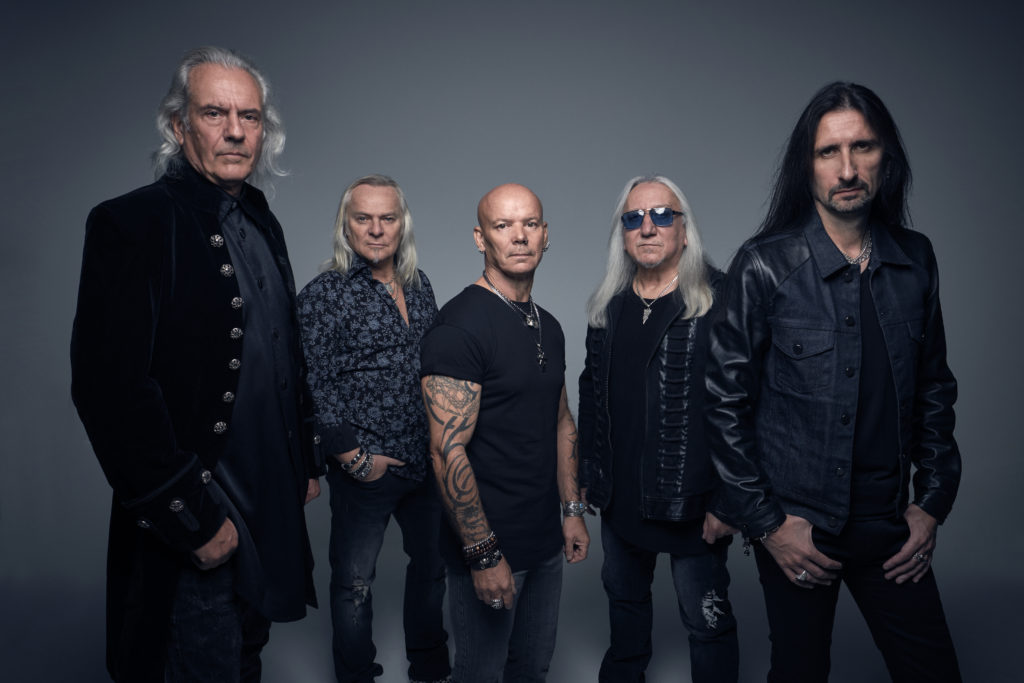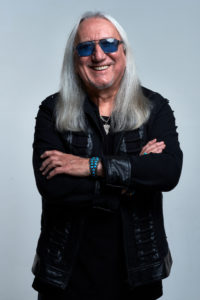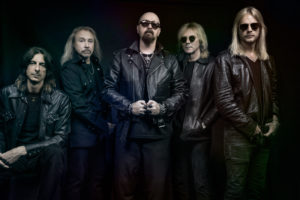
Classic rock and metal fans in more than 30 cities across North America are going to have one amazing night of music on their hands, as iconic British classic rockers Uriah Heep are in the midst of a run of shows opening for the legendary metal band Judas Priest, representing a combined century of bombastic concert excellence all in once evening.
The tour features 33 shows with the two acts, as well as an additional six shows where Uriah Heep are the headliners in smaller venues. Of the shows with Judas Priest, seven are in western Canada: June 8 in Saskatoon, June 10 in Lethbridge, June 11 in Edmonton, June 13 in Dawson Creek, June 14 in Prince George, June 16 in Kelowna and June 17 in Abbotsford, before the tour hops back across the border into the American Pacific northwest.
“I think this coupling with Judas Priest is going to be a very successful one, because Priest are who they are; they are the great metal band from the past and still standing their ground and will continue to do so long into the future. And Uriah Heep, with our track record that speaks for itself, I think it’s a great ticket for anyone who comes along to see the show and get rocked out of their heads,” said Uriah Heep keyboardist Phil Lanzon, who also does some lead vocal work as well as contributing significantly to the band’s songwriting process over his 34 years in the group.
“And I know we’ll be hanging out with those guys. We met them last year at a festival and we got on really well. I know [Judas Priest vocalist] Rob Halford is looking forward to the tour for the two bands being together. We will be getting on great, and the fans will be able to see what a good time we’re having.”
Uriah Heep is continuing to tour the world in support of their 25th and latest album, Living the Dream, which was released through Frontiers Music Srl late last year. It’s been one of the band’s busiest touring cycles – an indication that even well into their 50th year, Uriah Heep is still very much firing on all musical cylinders.
“We did a massive tour of the entire continent of Europe and Scandinavia over the winter months, so we covered every angle – both eastern and western Europe, the whole lot. We popped over to Japan and have been doing some festivals too. There has not been much of a break, to be honest with you, apart from a little bit over Christmas and New Years,” said Lanzon.

“For us, we’re as busy as we want to be. It’s a question of doing what you feel you can do. You don’t want to go too far, especially not at our age. We have been pretty busy, and we’ve got another busy year coming up. We’ve got eight weeks in America and Canada as you know, followed by a festival in Europe every weekend in the summer, followed by another extensive tour of Scandinavia in the fall and some big festival events back home in England. We’re already preparing for another tour starting in January 2020 and of course we are doing a big cruise at the end of February, which runs into another American tour. So, our schedule is pretty well full up until then, at which time we will begin work on a new album.”
Uriah Heep was a prolific producer of albums throughout the 1970s, where they bridged the gap between the fantastical progressive rock tomes by the likes of Yes and Genesis, and the more blues-based hard rock stylings of Deep Purple, earning themselves a loyal fan base through albums such as Demons and Wizards, The Magicians Birthday, Firefly and Fallen Angel. Their productivity dropped off as the band went through a number of lineup changes through the 1980s and 1990s but has picked up again in the 21st century. Only co-founder/guitarist/songwriter Mick Box has stayed the course though all incarnations of Heep. Lanzon and Canadian vocalist Bernie Shaw joined in 1986, drummer Russell Gilbrook came on board in 2007, while Davey Rimmer took over bassist duties in 2013, just in time to work on the band’s outstanding 2014 release, Outsider.
To maintain the creative impulse and the passion for writing, recording and performing for so many years is a credit to Box and his bandmates, but also a credit to the fans, both young and old, who continue to buy the albums, and come to the shows.
“If you want to go back in time, say starting around 1970, the kids at the time that were into bands like Uriah Heep and Black Sabbath and Deep Purple, they were say 20 years old. And they grew up with the music and they grew up with our music through the 1970s and through the 1980s and it still stays with them, until they have kids of their own. And those kids hear the music and many of them love the music and it goes on like a cycle. That’s why you’re seeing so many young people at our shows, because they have been brought up on the music, and they love that music and they want to go see it live, because its something that was created before they were even born, so it’s got an ever greater attraction for them,” Lanzon said, adding that many of the fans also appreciate the fact that Uriah Heep has never stopped creating new music.
“It’s not an easy thing to rest on your laurels. It wouldn’t feel right to do that. You would just be going through the motions, so you might as well become a cover band. And also, when we write a new album, we always have the past and the people in mind. We can’t venture off too far to the left or too far to the right and change the style of the band. The band will always have its hallmarks, which are basically like a blueprint that we stick to. And that’s why the songs we write today fit in well with the older songs. Therefore, people love then. People have grown up with Uriah Heep music and look forward to the new albums very much. We often have fans telling us how much they like the new record, but that they can’t wait for the next one. And it’s very encouraging to see, especially the young fans that we’re getting nowadays, singing the words to both the old hits and the new songs.”
As one of the primary writers in the band, Lanzon works closely with Box on new material for each album. But he is always seeming to find time to compose new music, regardless of whether there is a new Heep album in the offing.

“In my case I tend to write all the time, not just for Uriah Heep, but also for my solo albums, and I can’t stop. It’s like a little thing in the brain that won’t allow you to stop; that’s the only way I can explain it. It’s always exciting to create new stuff all the time, and each time you venture into a new song, it’s like a new house that you’ve entered and that in itself is exciting because you don’t know where the journey is going to end up – that’s part of the fun of it. And that’s something that’s never rubbed off,” he said.
“The good thing about getting older as a songwriter is of course you’ve had a lot of experience, and you can’t put a price on that experience. It’s something you acquire over time which gives you the fine edge when you’re creating music. It’s where creativity meets the craft. With Mick, our principle of writing is that I write all the time anyways. Mick has his own little recording thing at home, and he writes his bits and pieces all the time too, between touring and spending time with his family. We knock out an awful lot of material on our own, before we even get together. But when it is time, in other words when there’s another album on the horizon, we make the time to get together and we pour out all the material that we have been playing around with, put it into the pot and out of the pot we dig out what we like. That’s basically how it works. ”
Lanzon is also of the firm belief, as are most rock and metal bands, that the long-playing album, whether in CD, vinyl or digital formats, is still the preferred way to release music.
“An album of material, whether it be eight, nine, 10, 12 or even 15 songs, is till the projection of a cross-section of what a band is still capable of. The ideal format of an album or CD is approximately 10 or 11 tunes, which gives the world a good idea of where the band is right now. If you put too many songs on an album, I think it can be a little bit tiring. If you put too few on, then it doesn’t have the same impact. I thin 10 to 12 tracks is the optimum.”
Lanzon said he and his bandmates are looking forward to their return to Canada and to playing some smaller markets that might not normally see bands of the stature of Uriah Heep and Judas Priest, adding that he just loves to play anywhere fans are looking to have a good time.
“It’s a treat because, like you said, we’ve played just about everywhere you can possibly play on the planet, and it’s nice to get into towns where you’ve never been before or haven’t been for a long time. Honestly, it doesn’t make the big venue or the smaller venue any different in terms of our approach. Each one is a show, and every show we play is in front of people who want to come and see us, and to see their enjoyment is all that matters, big, or small or medium sized venue. And we have played every kind of venue, and everywhere you play, it’s just enjoyable,” he said, adding that even though Box has put in more than five decades of his life into Uriah Heep, there are no plans for he or the band to slow down any time soon.
“Mick’s philosophy is, as you say, to rock ‘till he drops. And don’t forget, Mick is Uriah Heep, and he is not the kind of person who is going to say, ‘oh I have had enough, I am just going to hang my guitar up.’ I don’t think that’s ever going to have to Mick.”
For more information on Uriah Heep and their ongoing tour with Judas Priest, visit www.uriah-heep.com.
- Jim Barber is a veteran award-winning journalist and author based in Napanee, ON, who has been writing about music and musicians for a quarter of a century. Besides his journalistic endeavours, he now works as a communications and marketing specialist. Contact him at jimbarberwritingservices@gmail.com.
SHARE THIS POST:
